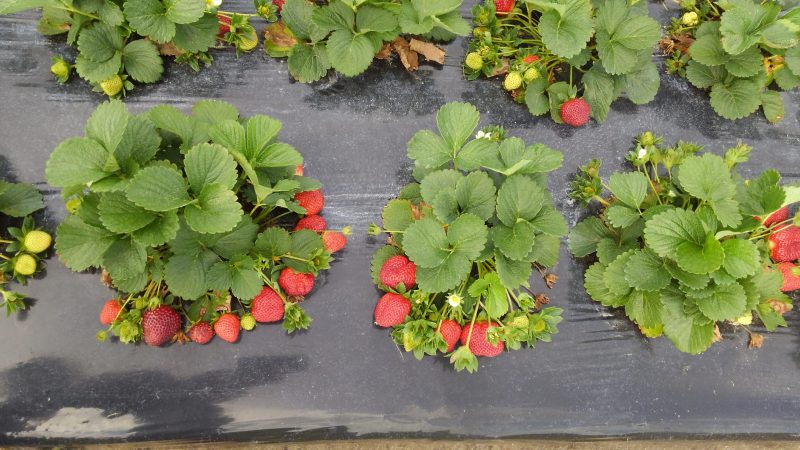
Strawberry nutrient management can include petiole sap testing and tissue testing. Credit: Jennifer Bearden, UF/IFAS
Many fruit and vegetable crops are grown using drip irrigation thus making fertigation an efficient way to supply necessary nutrients to crops. To know what nutrients are needed, we must test the soil, leaves and/or petioles.
Pre-season soil tests are a must! We need to know the soil pH and adjust it, if needed, prior to the growing season. This soil test will also give us values for soil phosphorus (P), potassium (K), calcium (Ca), magnesium (Mg), sulfur (S), copper (Cu), manganese (Mn), and zinc (Zn) (if using the UF/IFAS Extension Soil Testing Lab). This is just our starting point in our target nutrient management plan. Throughout the growing season, we can test the leaves or the petioles to further adjust nutrients to match plant demands.
Petiole sap testing can be performed in the field using petiole sap meters. Guidelines have been developed for several fruit and vegetable crops in Florida such as strawberry, tomato, and watermelon. This gives you instant numbers in the field for nitrogen (N) and potassium (K) to allow us to adjust these nutrients on a regular schedule. The process is fairly simple as seen in this video below. The publication Plant Petiole Sap-Testing For Vegetable Crops provides guidelines for appropriate N and K values based on petioles tests.
–
Plant leaf or tissue samples can also be used to fine-tune your targeted nutrient management. These samples are sent to a lab for analysis, so the results are not immediate but they provide more information than the petiole sap tests can. With tissue testing, we can learn the levels of N, P, K, Mg, Ca, S, B, Zn, Mn, Fe, and Cu. To gain insight for all of these nutrients, you will have to submit two samples. The most recently mature leaves will give you results for N, P, K, Mg, Zn, Mn, and Fe. For Ca, Cu, S, and B, you will need to submit younger leaves for testing. This is because these nutrients are not highly mobile in the plant tissue. For more information on plant tissue testing, read Plant Tissue Analysis and Interpretation For Vegetable Crops In Florida.
As always, for additional assistance with targeting your nutrient management plan for fruits and vegetables contact your local extension agent.
- Field Days are for Education– Recap of the WFREC 2025 Corn & Soybean Field Day - July 25, 2025
- Spray Drone Regulations - July 16, 2024
- 2023 WFREC Crop Variety Trial Results - February 2, 2024
